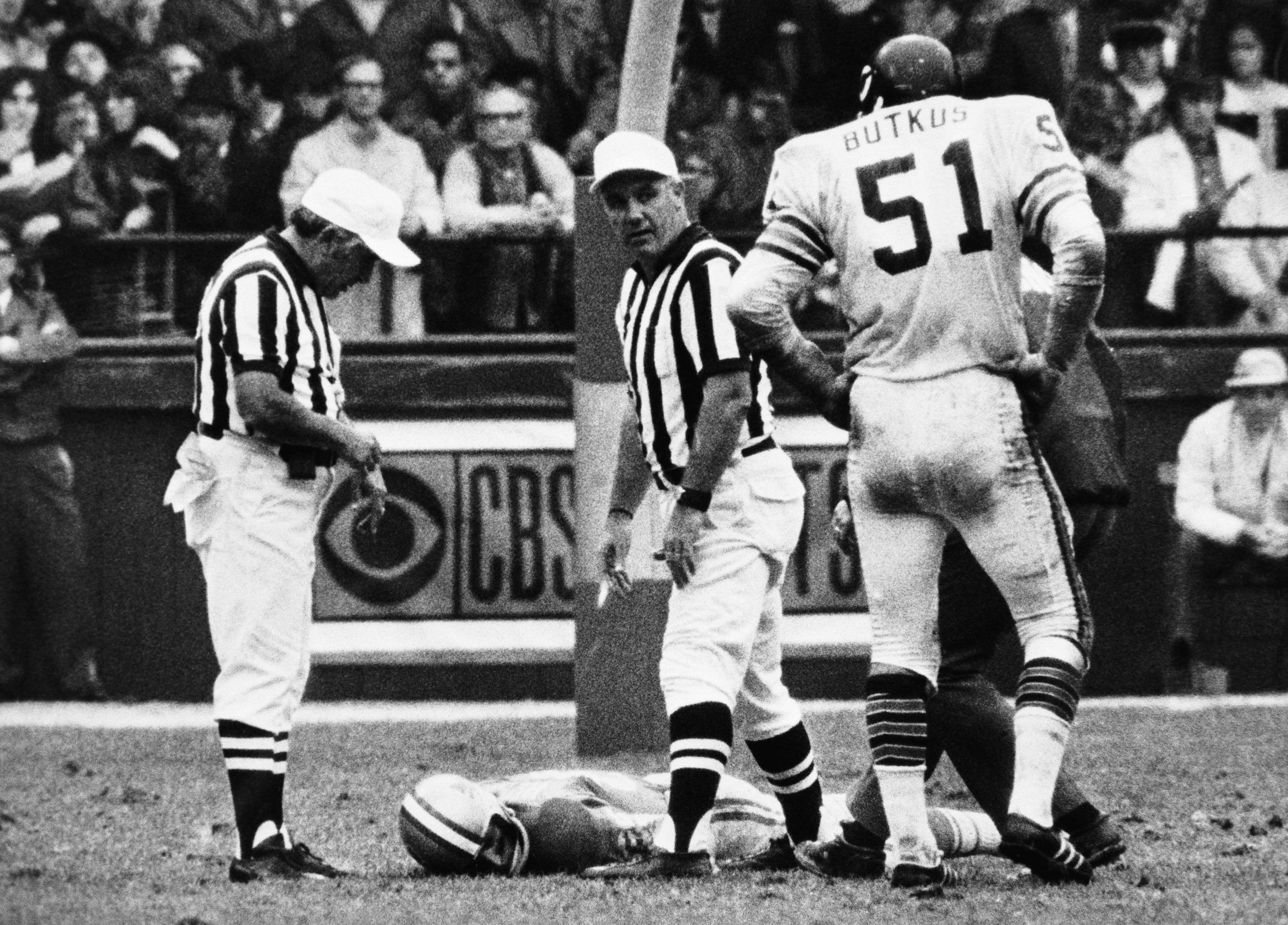NFL
Charles Fredrick Hughes: The Only NFL Player that Died on the Field
The NFL has experienced its fair share of life-threatening injuries and paralytic cases. The league has also registered one fatality case, owing to the on-field death of Charles Fredrick Hughes.

Chuck Hughes lies on the field//Getty Images
NFL has always been a dangerous sport since its earliest days. Fans enjoy the thrill arising from this beautiful game akin to the gladiator contests in the arenas of ancient years. It’s one of the reasons why only the greatest athletes are able to make it to the NFL.
The evolution of NFL has been gradual when factoring the risk involved. In the early days from 1900 to 1905, at least 45 players died from NFL injuries according to research. With a rise in popularity, President Teddy Roosevelt partly spurred on the need for significant changes so as to cut down on injuries and death. NFL obliged, and key changes were introduced such as the allowance of the forward pass.
Since then, the sport had profoundly developed into a multibillion-dollar corporation. Substantial padding, helmets and safety protocols have been adopted. However, it’s key to note that at its heart, it remains a sport in which grown men smash each other at full speed. To date, Charles Frederick “Chuck” Hughes remains the only NFL player to die after collapsing on the field.
Charles Frederick Hughes Player Profile
Charles Frederick Hughes was an American NFL wide receiver who played in the National NFL League (NFL), from 1967 to 1971 with the Philadelphia Eagles and the Detroit Lions.
Hughes was selected in the fourth round by the Philadelphia Eagles in the 1967 NFL/AFL draft after an exceptional college career with the Texas Western Miners. Chuck would then represent the Eagles for three seasons, before being traded to the Lions prior to the start of the 1970 season.
He was listed as a wide receiver for the Detroit Lions. However, he actually saw more action on Special Teams while being a backup at the wide receiver.
The Events Leading to his death
In August 1971, Hughes suffered an injury as a preseason game against Buffalo Bills was underway. Later, he collapsed in the locker room and was hospitalized. Unfortunately, the doctors couldn’t establish a diagnosis, although they suspected that he might have had a spleen injury. He was discharged, despite not having a full recovery.
For the next two months, after this incident, Hughes suffered from acid reflux and other unidentified maladies. However, he persisted on playing and underrated the health issues he was battling, terming them as “not that bad”.
Hughes insistence would later proof to be costly; during a week six game against the Chicago Bears in October the 24th, 1971, at the Tiger stadium, the unfortunate happened. In the fourth quarter with the hosts, the Lions, Hughes was sent into the game as an injury replacement. He caught a pass from quarterback, Greg Landry for 32 yards and a first down at the Bears' 37-yard line.
Three plays later, with the Lions having driven into Chicago territory, Hughes was used as a decoy in the play. This happened as Landry threw a pass that tight end Charlie Sanders dropped near the end zone. After the unsuccessful play, Hughes was running towards the huddle with 1:02 left on the clock when he collapsed, grabbing his chest, around the 20-yard line.
The Bears’ legendary linebacker Dick Butkus saw him go into violent convulsions and signaled immediately for help. Both teams’ doctors and trainers, as well as a doctor that was in the stands watching the game, ran to Hughes to give assistance.
Hughes was taken away by ambulance and the game continued amid a rock silent and stunned crowd. He was pronounced dead at Henry Ford Hospital at 5:34pm, even though he was dead before he was taken off the field.
The postmortem examination revealed that 28 year-old Hughes died of a coronary thrombosis which caused him to suffer a massive heart attack. The autopsy results further revealed, Hughes had suffered from an undiagnosed and advanced arteriosclerosis. This meant that one of his coronary arteries was 75% blocked.
Later examinations revealed Hughes’ family had a predominant history of heart disease. His teammates were informed of his death after the game had ended while they were still at the stadium.
Hughes was buried in San Antonio, Texas, and all 40 of his Lions teammates attended his funeral, including head coach Joe Schmidt. He was survived by his widow, Sharon Leah, and by his son, Brandon Shane, who was 1 year and 11 months old at the time.

Ian Mugo Wanyeki is based in Nairobi, Kenya. He is a sports enthusiast with vast knowledge of different sport disciplines. Ian is a graduate with a Bachelor’s of Science degree from Kenyatta University. He is a Kenyan journalist who’s worked as a sports analyst at Covenant Television Network, as a sports reporter at NTV and as a Sports Correspondent/contributor at Quartz Africa.